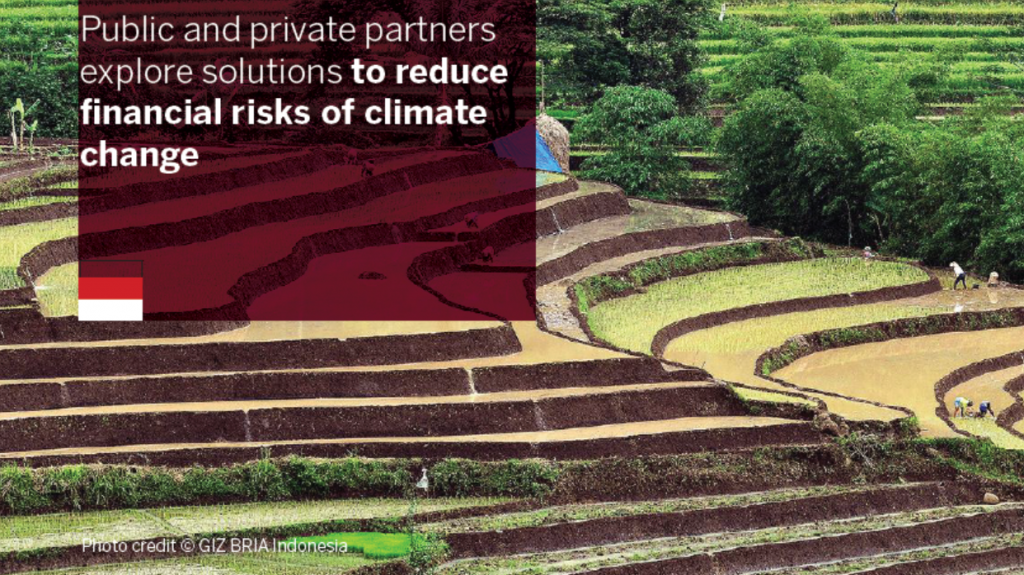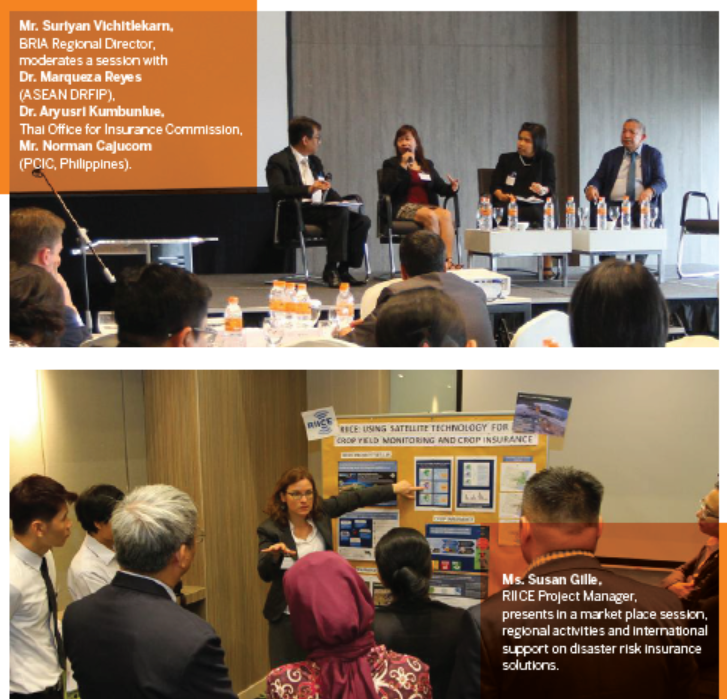Public and private partners explore solutions to reduce financial risks of climate change

More than 90 representatives from 11 Asian countries participated in an executive consultation forum and capacity building seminar to learn and share their experiences on mechanisms to deal with financial risks resulting from climate change. It was organized by the “Strategic Alliance on Climate Risk Transfer Solutions” (Strategic Alliance), which is a Public- Private-Partnership project between GIZ and the international reinsurer Swiss Re, with the objective to improve access to smart climate risk transfer solutions at sovereign and sub- sovereign levels for selected Asian and African governments.
The event was the first of its kind in the Asian region organized by the two partners and took place in Jakarta, Indonesia. Participants represented a wide variety of government institutions (e.g., Ministry of Agriculture and Ministry of Finance), the private sector (e.g., insurance companies) and development partners (e.g., ASEAN and the World Bank). It sought to provide a platform for Asian government officials to exchange on how their institutions can better protect their budget against unexpected climate related loss and increase their understanding of ex-ante and ex-post financial risk management instruments as well as empower participants to integrate sovereign risk transfer situations into a risk management strategy. The overall objective of the event was to allow the participants to learn and share their knowledge encompassing the following themes and topics:
- Developing a climate risk financing strategy to find the right balance between ex-ante and ex-post instruments, considering relative costs and benefits associated with different risk financing instruments
- Funding of public sector recovery and reconstruction needs
- Natural catastrophe insurance solutions
- Agricultural insurance schemes and products
- Availability of international guidance and support to countries seeking to develop risk transfer solutions
 Asia is one of the most disaster-prone areas in the world and has experienced the highest number of natural disasters worldwide in the last 115 years. These damages have strong peaks over the years, resulting in large economic, social and financial losses. Losses caused by natural catastrophes are largely not covered by insurance and have to be borne by individuals, companies or governments. In developing countries, protection through insurance is rare. In the event of a disaster, governments usually respond reactively. This could be, reallocating budget and funds for relief and reconstruction purposes, and requesting assistance from international donors. This drain on resources can have a damaging effect on a country’s longer-term economic and social development objectives, jeopadising many of the achievements made in pursuit of the economic growth. In his keynote presentation, Dr. Alexander Jaeger, the project leader of the Strategic Alliance at GIZ, emphasized that the financial impact of climate change will continue to represent a growing financial burden for societies across Asia and that climate risk transfer solutions such as insurance is one promising option for governments to address this worrying situation and financially cushion against those very strong disasters.
Asia is one of the most disaster-prone areas in the world and has experienced the highest number of natural disasters worldwide in the last 115 years. These damages have strong peaks over the years, resulting in large economic, social and financial losses. Losses caused by natural catastrophes are largely not covered by insurance and have to be borne by individuals, companies or governments. In developing countries, protection through insurance is rare. In the event of a disaster, governments usually respond reactively. This could be, reallocating budget and funds for relief and reconstruction purposes, and requesting assistance from international donors. This drain on resources can have a damaging effect on a country’s longer-term economic and social development objectives, jeopadising many of the achievements made in pursuit of the economic growth. In his keynote presentation, Dr. Alexander Jaeger, the project leader of the Strategic Alliance at GIZ, emphasized that the financial impact of climate change will continue to represent a growing financial burden for societies across Asia and that climate risk transfer solutions such as insurance is one promising option for governments to address this worrying situation and financially cushion against those very strong disasters.
ASEAN Sustainable Agrifood Systems (ASEAN SAS), Better Rice Initiative Asia (BRIA) and Remote Sensing-based Information and Insurance for Crops in Emerging Economies (RIICE) supported the organization and facilitation of the workshop as their field of work and the partners they cooperate with are strongly linked with the participating audience. The RIICE project, in particular, has supported partner countries in Southeast Asia in developing and operating an innovative remote sensing technology which enables them to regularly monitor their rice production and to assess damages in case of natural disasters such as typhoons, floods and droughts. The European Space Agency’s Sentinel radar satellites are the backbone of the RIICE technology. This risk management tool enables policy makers to better respond to the impacts of natural catastrophes in particular when it is embedded in new or existing crop insurance programs. In 2016/17 the first crop insurance pilot which integrates satellite-derived information is conducted in India under the umbrella of RIICE.
The Strategic Alliance pursues its activities in four different areas: awareness raising and technical capacity building, supporting national stakeholder dialogue process, developing and testing suitable products, and networking activities and establishing a community of practice. The activities of the RIICE project complement the goal of the “Strategic Alliance on Sovereign Climate Risk Transfer’s”: Providing governments with smart climate risk transfer solutions. RIICE can play an important part in an integrated disaster risk management approach, consisting of risk identification, assessment, prevention and mitigation and adaptation (risk transfer) by providing the underlying technological backbone. For the future, RIICE intends to strengthen its collaboration with the “Strategic Alliance on Sovereign Climate Risk Transfer” and Swiss Re in Southeast Asia.
For more information, please visit: jakarta-2016.climate-risk-insurance.org

